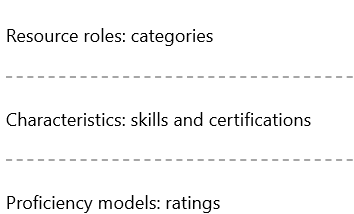Microsoft Dynamics 365 Field Service Bookable Resource Overview
It is important that organizations can schedule resources to support all the potential scheduling scenarios they provide. D365 Field Service scheduling engine will provides multiple resource types that can be used to handle every scenarios to execute a job. In addition, it defines resources for specific users, accounts, contacts, or facilities or equipment. Resources can also be defined that represent facilities, crews, or pools of resources.
For scheduling a service or work order we require the resource to have a certain role or that they possess a specific skill or certification to work on it. For example, to perform a security system install on a specific brand of security camera, the person being scheduled must be a certified installer and be highly skilled at installing that specific brand of security camera.

Resource Requirement: Once the service activity is created, another record called a resource requirement record is created. The resource requirement record is used to schedule the item in the system. It defines the specific details that are required to schedule the record. The requirement record is what is used to locate qualified resources that meet the requirement.
Bookable Resource Bookings: After a resource requirement is scheduled and record called a bookable resource booking is created that provides the specific details around the resource who is responsible for completing the Service Activity.
We can capture the total time spent working on the item.
Bookable Resource: Resources are people, facilities, locations or equipment that are needed to execute a service. Depending on the organization, the resources will be used a little bit differently. Resources are a key element in the service scheduling solution because they represent the people and/or equipment that are assigned to execute a service.
Following are the bookable resource types:
- User: Specifies the resource as an internal user mapped to a Dynamics 365 user record. This is likely going to be the most common type of resource that will be used with service scheduling.
- Generic: Generally used as a place holder to define a type of resource that is needed until a specific named resource can be used in its place.
- Contact: Specifies that the resource is associated with a Dynamics 365 contact record.
- Account: Specifies that the is associated with a Dynamics 365 account record.
- Equipment: Defines the resources as a specific piece of equipment or asset.
- Facility: Represents a facility that can be scheduled such as a building or room or location.
- Pool: Resource pools allows you to assemble groups of similar resources to manage capacity and give schedulers the option to assign specific resources at a later time.
- Crew: Resource crews allow you to search and schedule multiple resources at once.
Related Tables for Bookable Resource:
Characteristics: Characteristics are another way of saying resource skills. Defines the skill or certification that a resource possesses. Characteristics available are based on the resource skills that have been defined for the organization.
Rating value: Defines the level of proficiency that the resource has with that skill or characteristic.
The drop-down will be populated will all ratings defined for all proficiency models. You can select the down arrow to see the specific proficiency model a rating is associated with.
Category associations: Lets you define what resource roles associated with a specific resource.
Multiple resource roles / category associations can be defined for one resource.
Resource Territories: Lets you define the specific territories that a resource belongs to. A single resource can be associated with multiple territories.
Resource Roles: Specifies a specific role(s) in an organization that can be associated with different resources. Roles can be added to specific recourses and schedulable items like a work order to ensure that only resources with that role are suggested as people to work on an item.
Resource Skills: They specify a specific skill or certification that can be associated with different resources. They are also referred to as characteristics in Field Service. Each characteristic will need to have a Characteristic Type defined by Skill or Certification
Proficiency Models: Are used with resource skills to define how proficient someone is on an item. Proficiency models can be leveraged to define different types of scenarios. In simple terms defined below.

Work Hours: When you are scheduling resources on the schedule board, the resources working hours are used to help determine availability. Each resource that you create needs to have their working hours and time zone information defined to ensure that they are being displayed correctly and are not potentially being scheduled outside of times they are available.
Time-Off Request: Keep the schedule board in Dynamics 365 Field Service up to date by logging time-off requests. For example, if one of your field technicians is taking a vacation, it’s important to log the request so that a dispatcher can see the time-off request on the schedule board when scheduling a work order.
Resource Location: One of the most important items that needs to be defined is the location information that will be used by the schedule board for the resource.
Start location: Defines where the resource begins their day. This is used to assist in route mapping for the resource.
End location: Defines where the resource ends their day. This is used to assist in route mapping for the resource.

Hope this blog post given some idea about bookable resources and related tables. I have shared from my point of view & as per my product knowledge. Happy to hear from others if I have missed anything.

Leave a comment